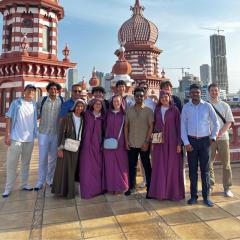University of Queensland alumni, John and Gay Hull have been generous supporters of research at UQ for almost a decade. Their philanthropy, focused on early career researchers in biomedical and structural engineering, has helped to provide opportunities for talented and creative researchers, taking their projects to new heights.
A million-dollar gift from the couple in 2018 has contributed to the development of innovative technology and methods to benefit the health of our society.
Their support ensures proof of concept findings and prototypes can be leveraged to apply for more substantial funding and larger-scale application, setting young researchers on a path to future success.
John and Gay decided to establish an endowment fund to support early career research in perpetuity, ensuring their gift will make a meaningful – and ongoing – contribution to UQ’s philanthropic Campaign to Create Change and, in particular, with its priorities of driving discovery and impact.
The couple said it was important to them to donate to UQ researchers, as both John and Gay, as well as all their children, are graduates of the University.
“We have chosen the field of biomedical research because of the potential benefits to the quality of people’s lives,” said Mr and Mrs Hull.
John and son, Graham, are both involved in the civil engineering construction industry and wished to encourage further research in this area.
Civil engineering researcher Dr Juan Hidalgo is one of the beneficiaries of the Hull family’s donation.
“My research is focused on the development of guidelines for the fire-safe use and design of engineered timber structures in mid and high-rise buildings,” he said.
“This funding has enabled me to develop fire tests of timber compartments to study the self-extinction phenomenon.”
Associate Dean (Research) Professor Stuart Crozier said the Faculty has already seen excellent outcomes from the projects funded by the Hull family’s donations in the past, and a number of these have had success in larger federal grant schemes.



